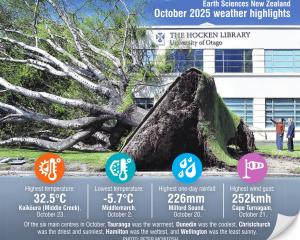The Otago Regional Council is "well ahead of the majority'' of the Government's goals for improving water quality, council policy planning and resource management director Fraser McRae says.
He was presenting work the council had done for its submission to the Ministry for the Environment and the Ministry for Primary Industries' Clean Water 2017 package at the council's meeting in Oamaru.
Mr McRae said unlike some regions in New Zealand, Otago was more in a position to ``maintain'' as opposed to ``regain'' water quality.
The Government package, which includes updating the National Policy Statement for Freshwater Management 2014, has set a target of making 90% of the country's rivers and streams ``swimmable'' by 2040.
``Essentially it's trying to achieve the right thing,'' Mr McRae said. ``It's more about the `how' which I think this council should focus on.''
With Otago's alpine lakes and tributaries being of such high quality, he was concerned the Clean Water package did not state explicitly that councils could set overall water quality standards beyond the national standards.
``We would like that specifically stated, and haven't been able to have that put in.''
For swimmable water, the council already met the proposed good quality water measures in ``many rivers and lakes'' and expected to achieve good-quality water across the region by 2025.
The national plan sets out an interim target of 80% of rivers and lakes swimmable by 2030.
Mr McRae's report to councillors shows questions remain for the council about how its current monitoring and reporting practices might be affected by the new national policy.
His report notes the proposed Freshwater Improvement Fund, $100 million over the next 10 years, was intended for the Ministry for the Environment's priority catchments.
``Their priorities include the whole of the Clutha Mata Au catchment, but not Dunedin urban catchments, such as Tomahawk,'' his report states.
As other regional councils were ``control focused'' rather than ``enabling focused'', as Otago was, Mr McRae said while regional councils were able to set ``more stringent requirements'' for stock exclusion fencing he believed farmers would often have reasons particularly suited to their land for where fencing should go.
``Farmers know their paddocks better than we can write a rule for it,'' he said.
The council decided Crs Gretchen Robertson, Bryan Scott and chairman Stephen Woodhead would review the submission before it was submitted by the April 28 deadline.











